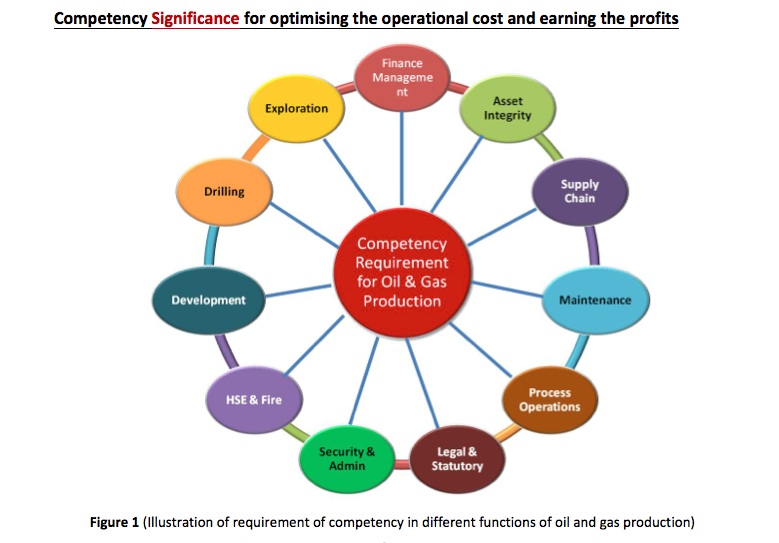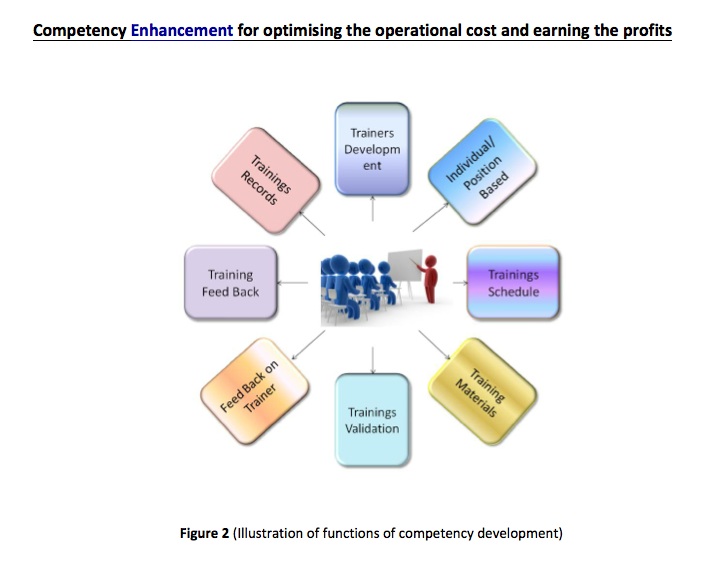Oil and gas asset operation is unique in nature; it is not like other businesses in the world. The operating company or operator (a company that is involved in production of oil and gas) has to produce the oil and gas by using its manpower with wide varieties of process facilities and infrastructures that are run by operator’s team. Most of the positions require special competency to satisfy the operational requirements. The operating company asset management team needs to ensure the competency of work groups by abiding by the statutory framework of the host country. This article explores the criticality of competency for the smooth running of oil and gas production operations.
Lifecycle of the Oil and Gas Exploration and Production Business
In the oil and gas business, the asset life cycle has five phases:
- Exploration
- Appraisal
- Development
- Production
- Decommissioning
Each stage requires financial and technical commitment. Among all these phases, only the production phase provides positive cash flow to the operating company; the other phases involve expenditure by the company. There is risk and uncertainty associates with expenditures in the exploration, appraisal, and development phases. The decommissioning phase expenditure is a statutory commitment, irrespective of revenue and returns on investment.

Finance
Each stage involves risk investments and approvals from government. The oil and gas operating company must produce the oil and gas quantity committed to government, irrespective of reservoir complexity and uncertainty. All the committed production is to be taken out by operating company with its risk investments, and the profit/income is to be shared with government. The price of selling and distribution of oil and gas also is fixed by government only, irrespective of supply versus demand. Sometimes price may vary because of global causes. This oil and gas is a fuel and feedstock for many downstream industries. This production will have strong influence on the economy of a country. Operating the company amid variable factors, and acclimatizing the operations to the entire global variable is only possible with a competent team.
Asset Integrity
Ensuring the integrity of oil and gas assets is a challenge for the oil and gas operator, because many of different infrastructures, including: offshore structures, subsea pipeline, subsurface pipeline, rotary equipment, static equipment, storage tanks, concrete civil structural supports, separators, boilers, pressure vessels, process piping, process instrumentation, process safety system, buildings, control centers, information systems, warehouses, and functions such as maintenance, operations, internal corrosion monitoring, cathodic protection, coatings, material selection, inspection, loss prevention, behavioral safety, change management, process safety, security, and fire safety.
Supply Chain
Supply chain components are critical for production of oil and gas. The operator must successfully manage the supply chain for producing the oil and gas; failure of one or more components of the supply chain can hamper oil and gas production. These components include chemicals, spares, consumables, original equipment manufacturer (OEM) services, outsourced services, outsourced manpower, inventory management, warehousing, and procurement. So operator has to establish flawless supply chain management to ensure the availability of operations for production, which is only possible with a competent team.
Operations
Oil and gas production is involved with wide varieties of process facilities and infrastructures. The operations department must monitor the process of fluids from down hole to custody transfer. These operations involve many risks, and only competent people can ensure the smooth running of operations.
Maintenance
In oil and gas operations, equipment availability plays a vital role in running the plant to meet the expectations of top management. For most of the operations in oil and gas, a variety of equipment should be available to carry out operations. Since equipment is interlinked, downtime of one piece equipment affects other availability of other equipment. Every hour more equipment is available adds value to operations. Maintenance planning plays an important role in making equipment available to operations. Likewise, integrating maintenance planning with other departments and planning for all the required resources also is required.
Legal and Statutory
Oil and gas exploration and production involves many external factors, including legal and statutory compliance with the host country’s government policies. The operator may be required to report to the relevant ministry; technical arms; safety directorate; pollution control overseer; and regional and local administrators for clearances, approvals, and permissions. These statutory approvals are required before the operator can commence oil and natural gas production. Competency is required for fulfilling all these requirements.

Recruitment
Reviewing a resume and briefly interviewing a candidate may result in a qualified employee. Even though HR is working sincerely to recruit experienced people for oil and gas operations, candidates may not possess the required skills. Competencies must be assessed and attempts made to fill any gaps when a person is hired.
Competency Development
After discussion with the operations team, Training departments should prepare a competency matrix for each and every position, with requirements, expectations, and outcomes. KPIs (key performance indicators) are to be set for measuring and assessing the competency. Initially, competencies of existing employees in specific roles should be identified (based on their previous qualifications, knowledge, trainings attended, and experiences), and then requirements should be set, so competency gaps can be planned for and filled by providing the relevant trainings.
Trainings
Trainings can be divided into different categories such as statutory, HSE, behavioral, and Technical. All the training needs should be prepared based on the position and person. During preparation of training needs, a person’s qualification, knowledge, experiences, and earlier trainings should be considered. Suitable training institutes should be identified based on the requirement for external training. Internal trainings can be conducted with a suitable trainer inside the organization.
Mentoring
The operator should develop a culture of transforming the competency of experienced employees within the organization. This will not only save the cost of trainings but also will develop the culture and competency among the groups. Internal trainers (mentors) should be developed, and trainees should be assigned to the relevant mentors.
Organizations involved with oil and gas production need to concentrate on the competency development of work groups; this helps pave the way for the smooth and effective operation in oil and gas fields. This will reduce operating cost, incidents, and damage, which can directly increase the organization’s profit.
REFERENCES
- Tata L.N. Murthy, “Integrated Corrosion Management of Oil and Gas Installations,”
August 2016, Pipeline and Gas Journal
- Tata L.N. Murthy, “Integrating and Planning Maintenance Activities in Oil and Gas Installations,” September/October 2016, Inspectioneering Journal
- Tata L.N. Murthy, “Oil and Gas Asset Require Unique Financial Management System” (Web Exclusive) April 2017, Petroleum Africa, Mahe, Seychelles
- Tata L.N. Murthy, “Ensuring the Integrity of Oil and Gas Assets”
September/October 2017, Inspectioneering Journal
Tata L.N. Murthy is assistant general manager – OGT (Production Chemistry) and head of Chemistry – KG Asset, Gujarat State Petroleum Corporation Ltd. Murthy has written 17 papers published in peer-reviewed international journals and holds the following professional designations: MSc (Applied Chemistry), C.Chem (Chartered Chemist), and MRSC (RSC) (London); FICC, FICS Corrosion Technologist (NACE International) (USA), ASNT NDT Level II (PT, MT, RT, UT); DST, DISM, PGDESD, MBA (Operations), PG Dip in Petroleum Engineering (Herriot Watt), (UK). For more informatio, visit: https://in.linkedin.com/in/tata-ln-murthy-59466342 and www.lnmurthytata.page.tl




